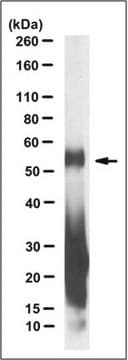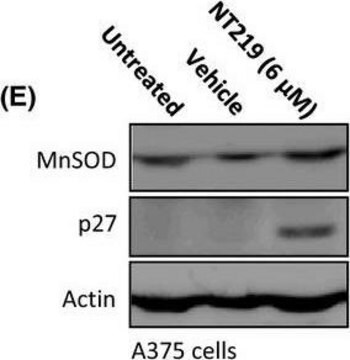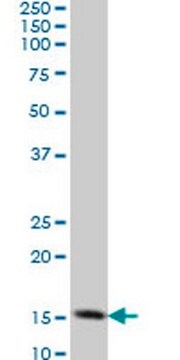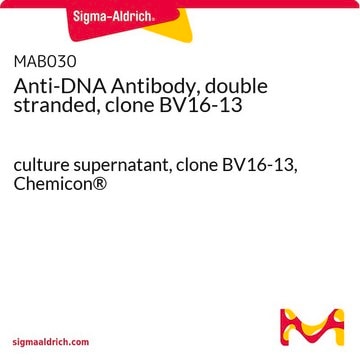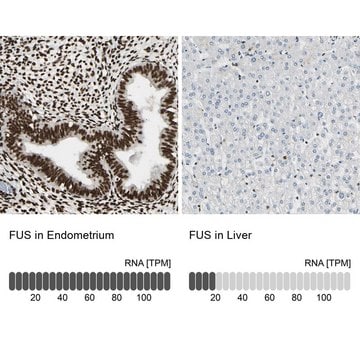推荐产品
生物源
rat
品質等級
抗體表格
purified antibody
抗體產品種類
primary antibodies
無性繁殖
5A2, monoclonal
物種活性
human
物種活性(以同源性預測)
all
濃度
1 mg/mL
技術
immunohistochemistry: suitable
western blot: suitable
同型
IgG2aκ
運輸包裝
wet ice
目標翻譯後修改
unmodified
基因資訊
human ... C9ORF72(203228)
一般說明
C9ORF72非编码区中的六核苷酸(GGGGCC)重复扩增是FTD和ALS(c9FTD/ALS)的主要遗传原因。GGGGCC重复序列的RNA结构使这些转录本易受翻译重复—序列相关的非ATG(RAN)翻译的非常规机制的影响。GGGGCC重复序列在所有阅读框中的翻译将产生三种二肽重复(DPR)蛋白poly-(Gly-Ala)、poly-(Gly-Pro)和poly-(Gly-Arg)。poly-GA和poly-GP蛋白具有极强的疏水性,可能形成细胞内聚集体
特異性
该抗体识别C9ORF72/C9RANT(poly-GR)和其他含有poly-GR序列的蛋白,如EB病毒蛋白EBNA2
免疫原
对应于包含GR重复序列的EB病毒核抗原2(ENBA2)的线性肽。
表位:poly-GR
應用
使用经验证可用于蛋白质印迹&IHC的抗C9ORF72/C9RANT(poly-GR)抗体(克隆5A2)检测C9ORF72/C9RANT(poly-GR)。
免疫组织化学分析:一个代表性批次在具有C9ORF72六核苷酸扩增的C9orf72患者的脑组织中检测到poly-GR包涵体(Mori,K.,et al.(2013).Science.339(6125):1335-1338.)。
研究子类别
神经退行性疾病
神经退行性疾病
研究类别
神经科学
神经科学
品質
通过蛋白质印迹法使用具有15个GA、GP或GR重复序列的GST融合蛋白以及不具有任何重复序列的单独GST进行评估。
蛋白质印迹分析:0.2 μg的该抗体检测10 μg具有15个GR重复序列的GR-GST重组蛋白。
蛋白质印迹分析:0.2 μg的该抗体检测10 μg具有15个GR重复序列的GR-GST重组蛋白。
標靶描述
可变
外觀
形式:纯化
纯化的大鼠单克隆IgG2aκ,溶于含0.1 M Tris-甘氨酸(pH 7.4、150 mM NaCl和0.05%叠氮化钠的缓冲液中。
纯化蛋白G
儲存和穩定性
自接收之日起,在2-8°C下可稳定保存1年。
免責聲明
除非我们的目录或产品随附的其他公司文件中另有说明,否则我们的产品预期仅用于研究用途,不得用于任何其他目的,包括但不限于未经授权的商业用途、体外诊断用途、离体或体内治疗用途或对人类或动物的任何类型的消费或应用。
未找到合适的产品?
试试我们的产品选型工具.
儲存類別代碼
12 - Non Combustible Liquids
水污染物質分類(WGK)
WGK 1
閃點(°F)
Not applicable
閃點(°C)
Not applicable
Sulfated disaccharide protects membrane and DNA damages from arginine-rich dipeptide repeats in ALS.
Yu-Jen Chang et al.
Science advances, 10(8), eadj0347-eadj0347 (2024-02-23)
Hexanucleotide repeat expansion in C9ORF72 (C9) is the most prevalent mutation among amyotrophic lateral sclerosis (ALS) patients. The patients carry over ~30 to hundreds or thousands of repeats translated to dipeptide repeats (DPRs) where poly-glycine-arginine (GR) and poly-proline-arginine (PR) are
Philip McGoldrick et al.
Neurology, 90(4), e323-e331 (2017-12-29)
Suggested C9orf72 disease mechanisms for amyotrophic lateral sclerosis (ALS) and frontotemporal lobar degeneration include C9orf72 haploinsufficiency, G4C2/C4G2 RNA foci, and dipeptide repeat (DPR) proteins translated from the G4C2 expansion; however, the role of small expansions (e.g., 30-90 repeats) is unknown
Alan S Premasiri et al.
Frontiers in pharmacology, 11, 569661-569661 (2020-10-06)
Repeat expansion mutations in the C9ORF72 gene are the most common genetic cause of amyotrophic lateral sclerosis (ALS) and frontotemporal dementia (FTD). Repeat-associated non-AUG translation of this expansion produces dipeptide repeat proteins (DRPs). The arginine containing DRPs, polyGR and polyPR
Amrutha Swaminathan et al.
Human molecular genetics, 27(10), 1754-1762 (2018-03-13)
Large expansions of hexanucleotide GGGGCC (G4C2) repeats (hundreds to thousands) in the first intron of the chromosome 9 open reading frame 72 (C9orf72) locus are the strongest known genetic factor associated with amyotrophic lateral sclerosis and frontotemporal lobar degeneration. Different
Jeannie Chew et al.
Molecular neurodegeneration, 14(1), 9-9 (2019-02-16)
A G4C2 hexanucleotide repeat expansion in the noncoding region of C9orf72 is the major genetic cause of frontotemporal dementia and amyotrophic lateral sclerosis (c9FTD/ALS). Putative disease mechanisms underlying c9FTD/ALS include toxicity from sense G4C2 and antisense G2C4 repeat-containing RNA, and
我们的科学家团队拥有各种研究领域经验,包括生命科学、材料科学、化学合成、色谱、分析及许多其他领域.
联系技术服务部门